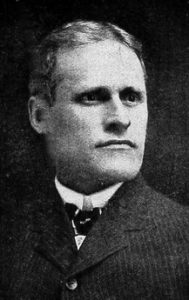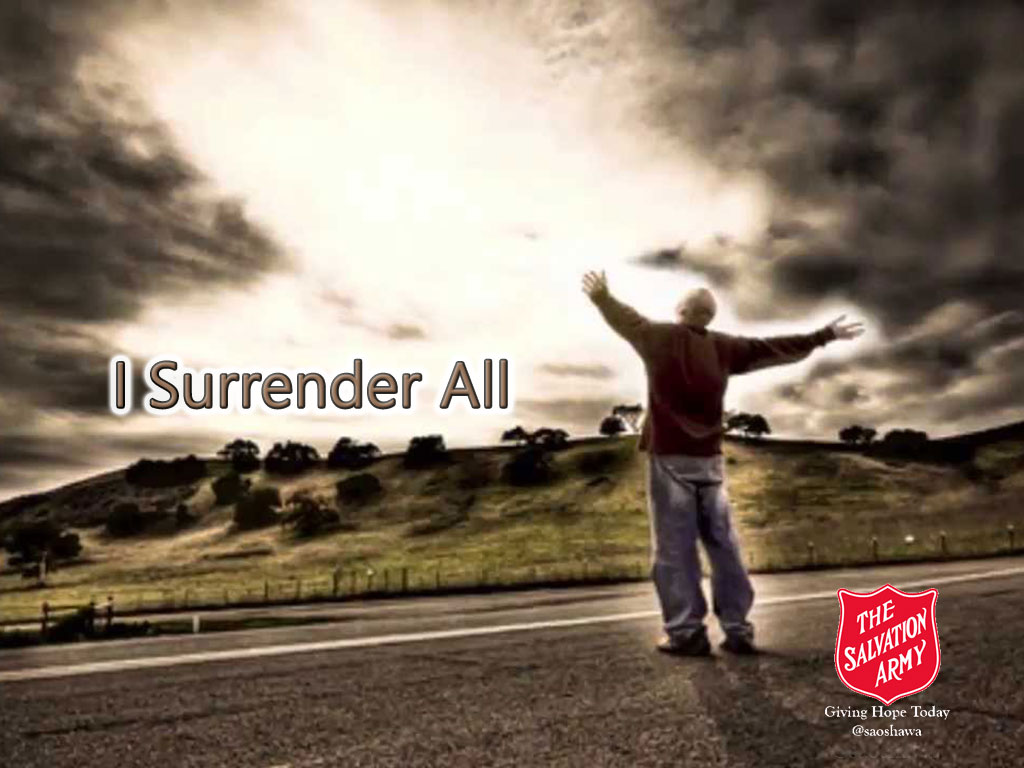All to Jesus I surrender,
All to Him I freely give;
I will ever love and trust Him,
In His presence daily live.
I surrender all, I surrender all.
All to Thee, my blessèd Saviour,
I surrender all.
All to Jesus I surrender,
Humbly at His feet I bow,
Worldly pleasures all forsaken;
Take me, Jesus, take me now.
All to Jesus I surrender –
Make me, Saviour, wholly Thine;
Let the Holy Spirit witness,
I am Thine and Thou art mine.
All to Jesus I surrender –
Lord, I give myself to Thee;
Fill me with Thy love and power;
Let Thy blessing rest on me.
All to Jesus I surrender;
Now I feel the sacred flame;
O the joy of full salvation!
Glory, glory to His name!
 Judson Van De Venter learned by experience how surrender brings victory in the Christian life. He was born on a Michigan, USA, farm in 1855, and was interested in music and visual arts in his youth. He came to know Christ personally when he was seventeen. Judson became an art teacher and supervisor of art in a high school in Sharon, Pennsylvania. He also studied in several singing schools. He was active in his local church, singing in the choir and participating keenly in evangelistic meetings. Knowing his ability as well as his sense of fulfillment in these events, friends advised Judson to resign from teaching and become a full time music evangelist. Judson struggled with this decision for five years. Finally, on his knees, Judson told the Lord that if He wanted this career change, he would surrender all to Him and follow this new path. Thus he began travelling in the U.S., England and Scotland, leading the singing for various evangelists, and winning people to Christ. It was while he was staying at the home of George Sebring in East Palestine, Ohio, that he wrote this song about surrender. The melody was written by Winfield Weeden, who sometimes assisted Judson in leading the singing at the evangelistic meetings. This song title was on Weeden’s tombstone.
Judson Van De Venter learned by experience how surrender brings victory in the Christian life. He was born on a Michigan, USA, farm in 1855, and was interested in music and visual arts in his youth. He came to know Christ personally when he was seventeen. Judson became an art teacher and supervisor of art in a high school in Sharon, Pennsylvania. He also studied in several singing schools. He was active in his local church, singing in the choir and participating keenly in evangelistic meetings. Knowing his ability as well as his sense of fulfillment in these events, friends advised Judson to resign from teaching and become a full time music evangelist. Judson struggled with this decision for five years. Finally, on his knees, Judson told the Lord that if He wanted this career change, he would surrender all to Him and follow this new path. Thus he began travelling in the U.S., England and Scotland, leading the singing for various evangelists, and winning people to Christ. It was while he was staying at the home of George Sebring in East Palestine, Ohio, that he wrote this song about surrender. The melody was written by Winfield Weeden, who sometimes assisted Judson in leading the singing at the evangelistic meetings. This song title was on Weeden’s tombstone.
In 1923, Van De Venter moved to Tampa, Florida, and began teaching hymnology at the Florida Bible Institute. In retirement, he still visited and spoke at the college from time to time. In the 1930s, one student “sat wide-eyed” listening to him. That student was Billy Graham, who later wrote, “One of the evangelists who influenced my early preaching was also a hymnist, who wrote I Surrender All , the Reverend Judson Van De Venter….We students loved this kind, deeply spiritual gentleman and often gathered in his winter home at Tampa, Florida, for an evening of fellowship and singing.”
We students loved this kind, deeply spiritual gentleman and often Share on XWORDS: JUDSON VAN DE VENTER MUSIC: WINFIELD S. WEEDEN
S.A. SONG BOOK, 2015 EDITION, #636; 1987 EDITION, #474
REFERENCE: MORGAN, ROBERT J., THEN SINGS MY SOUL







